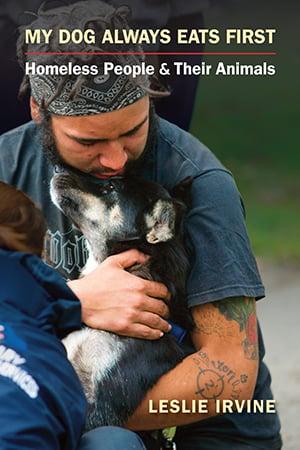Even before beginning the research for her book My Dog Always Eats First: Homeless People & Their Animals, Leslie Irvine had been thinking about what it means for a human to care for an animal. A decade before beginning the book, she’d encountered a man, with his dog, asking for money along a median on a busy street in Boulder, Colorado. When she offered him water and food for the dog and later tried to buy the dog from him, the man’s response was this: “I take good care of my dog. He has a great life. He runs around in the forest all the time … He’s got food. He’s got water. He’s had his shots. He never leaves my side. He’s fine.”
And as a shelter volunteer, Irvine remembered two stories in particular. One was about a human whose expensive, purebred dog kept escaping from the yard and ending up at the animal shelter; the owner waited until the last possible day to appear, letting the dog languish at the shelter in the meantime; eventually the owner relinquished the dog altogether, citing the escapes as “inconvenient.” The other story was about a man with no address or phone who lost his dog and walked hours to the shelter every day hoping to find her, eventually wearing out his shoes. With these two stories in mind, Irvine asks an important question: “Which dog would you say had the better life?”
While My Dog Always Eats First doesn’t answer this particular question, through Irvine’s firsthand research with unhoused people and their pets, the book highlights the issues and challenges faced by people and animals without homes and reveals the bonds that form, the roles animal companions fill for their unhoused guardians, the care the animals receive—and ultimately asks us all to consider what it really means to take care of an animal. Irvine writes that “the extant research literature on pet ownership among the homeless has documented that people claim to feel an intense bond with their animals, exceeding in measure the scores reported by the domiciled.”
My Dog Always Eats First is an academic work—Irvine is a sociologist, and the book cites numerous previous studies and articles; at least two of the book’s chapters had been published in academic journals—yet due to the quality of her interviews and the stories they tell, My Dog Always Eats First is important and accessible reading for anyone who cares about animals and the unhoused.
The myriad insights Irvine’s interviews reveal include the devotion of unhoused people to their pets, as well as the misconceptions the rest of the world has toward them. Irvine’s data came from interviews with seventy-five unhoused pet owners in Boulder, Colorado; Berkeley, Sacramento, and San Francisco, California; and Miami, Florida. She found interviewees primarily through the free veterinary clinics that served their animals, and was introduced to worlds she never knew existed: “People were living in crawl spaces under the freeway,” she writes of an encampment in San Francisco. “Some had lived there for over a decade. They worked, and they had phones. And they had dogs.”
Just as she’d believed about the man and his dog along the median in Boulder, Irvine learned from the unhoused community how the rest of the world saw them: “Most of the homeless pet owners had encountered some form of criticism from domiciled citizens about their right or ability to have a companion animal.”
Yet she also learned that the critics weren’t seeing the whole picture. When Pete (many interviewee names in the book were changed for privacy) ended up camping with his two dogs in Sacramento after losing his job, his home, and his truck in the span of a few months, he still fed his animals first. “These dogs eat before I do,” he told Irvine. “They’ll eat before I do, period. They eat well.”
Irvine found this theme to be consistent among those she interviewed. Toni: “My dog eats before I do. Way before me. She comes way before me.” Jerry: “When I don’t have any money sometimes for food, I’ll give ’em what I’m eating and go without food, ’cause I won’t see my animals go hungry.” Karl: “I make sure they my dog gets fed before me. If I gotta starve for a day so that she can eat, I do. She can’t go out and ask somebody, ‘Hey, I’m hungry. I need some food.’ I can.” Stan: “I make sure she gets good food. Even though I’m homeless I just make it a point, you know. She has a pretty good diet. And she’s never missed a meal.”
And some of those who were criticized made the point that they were taking good care of their animals not only be ensuring they were well fed but also by being with them all the time. As Toni complained to Irvine of housed pet owners, “You know what? All they do is leave their dog in their apartment for twelve hours out of the day. That’s not fair.” Similarly, a man named Kaz said, “I spend 24/7 with my dogs. They don’t leave my hip … They get 24/7 attention. I go to parks with them. They get to run around and have fun. They get to see new things every day and they’re exploring nature like they’re meant for.”
Irvine discovered that not all encounters among the unhoused humans with pets were critical; in fact, in many ways, unhoused people reported, having pets could also lead to positive encounters—whether a social interaction or an offer of food or treats for the pet. And many of those Irvine interviewed felt their pets inspired them to take better care of themselves, whether this meant getting clean or finding housing. Most unhoused pet owners would not give up their animals for a place to sleep. As a woman named Max told Irvine: “Finding a place to sleep is the hardest thing. But if my dog’s not welcome, hey, you know what? I only go where my dog’s welcome. I didn’t bring her into this situation just to dump her off in the street, or to put her in a kennel somewhere. It’s a lifelong commitment. We’re family.”
A man named Isaac said his pit bull, Raja, was the reason he was able to recover from cocaine and heroin addiction. He got into treatment because, he said, “me having him, I realized I didn’t want to live like this. I didn’t want to make the dog suffer, my best friend, living like this, homeless. I need to get myself together. I can have me a better life, and he can have a better life. That’s how I looked at it.” And Pali, who’d been in and out of jail for myriad offenses during her years of drug and alcohol use, was inspired by her dog Leadbelly to get sober and find subsidized housing—and she eventually founded Rocket Dog Rescue in his honor.
Many more stories like this appear in My Dog Always Eats First—and sometimes the rescues work both ways. Irvine tells the story of Candy, who lived in a school bus in San Francisco and looked after fifteen cats she had rescued from injury, illness, or abandonment. The bus had electricity, and Candy got the cats’ shots, sterilizations, and medical care with the help of Veterinary Street Outreach Services (VET SOS); she rehomed the ones she could. When asked if caring for them was too much, she told Irvine, “Oh, no … Animals are a godsend, and if someone else doesn’t want ’em, I’ll gladly take ’em. There’s no limit on how many I could love.”
In one chapter, Irvine makes an interesting comparison between the unhoused youth she calls “Travelers” in the book and her own university students. “My students had endless complaints about their lives. They grumbled about the amount of reading they had to do and the number of long papers they had to write. They protested that the faculty were apparently contriving to give all exams during the same week. They requested extensions on assignments and gave excuses for lateness based on the most trivial of events. None of the Travelers I met had graduated from college. Yet they seemed to see a better world, one that held more promise for them, than the world my students saw. The Travelers claimed to be living just as they wanted to live … Although I saw fatigue, hunger, and dirt—a lot of dirt—among the Travelers, I also saw cheerfulness and a sense of competence that I have seldom seen on university campuses.”
Among her hopes for this research, Irvine writes in the last chapter, is implications for housing policy; many of the unhoused people she met could not find housing that accepted pets, whether shelters or permanent homes. “Recognizing the bonds that homeless people share with their animals would greatly enhance the research and policy on housing … I recommend research on the beliefs, customs, and other issues that undergird no-pets policies and what might reform them.”
And recognizing that the company of companion animals makes all the difference for those who are unhoused is important for all health and human resource services. For Kim and her partner, their dog Maggie offered a sense of normalcy to the chaos of being newly homeless. “Maggie reminds us of what life can be like. She really is the whole thing. She’s my friend and family. She gives me that little piece of ‘I’m still here.’”
“In many ways, homeless pet owners have much in common with those who live in houses. Homeless people enjoy talking about their pets, and they will eagerly tell acquisition stories. They do their best to keep their animals safe and provide for them. They recognize their animals have minds, emotions, and identities, and they appreciate the companionship that only animals can provide. But in other ways, homeless pet owners differ significantly from the domiciled. The circumstances of homelessness make them vulnerable to situations that domiciled owners will never encounter. Few of us need to worry about police officers shooting our dogs, nor do we have to fear that our animals will be confiscated. We do not have to sleep with our dogs tied to our legs. We do not have to field insults as we walk or dogs or bring our cats to the veterinarian. We face no accusations of being unworthy of animal companionship. And most of us will never have to think about whom to feed first, or voice this as evidence of our ability to care for our animals.”
— Leslie Irvine, My Dog Always Eats First

Midge Raymond is a co-founder of Ashland Creek Press. She is the author of the novels Floreana and My Last Continent, the award-winning short story collection Forgetting English, and, with John Yunker, the suspense novel Devils Island.

